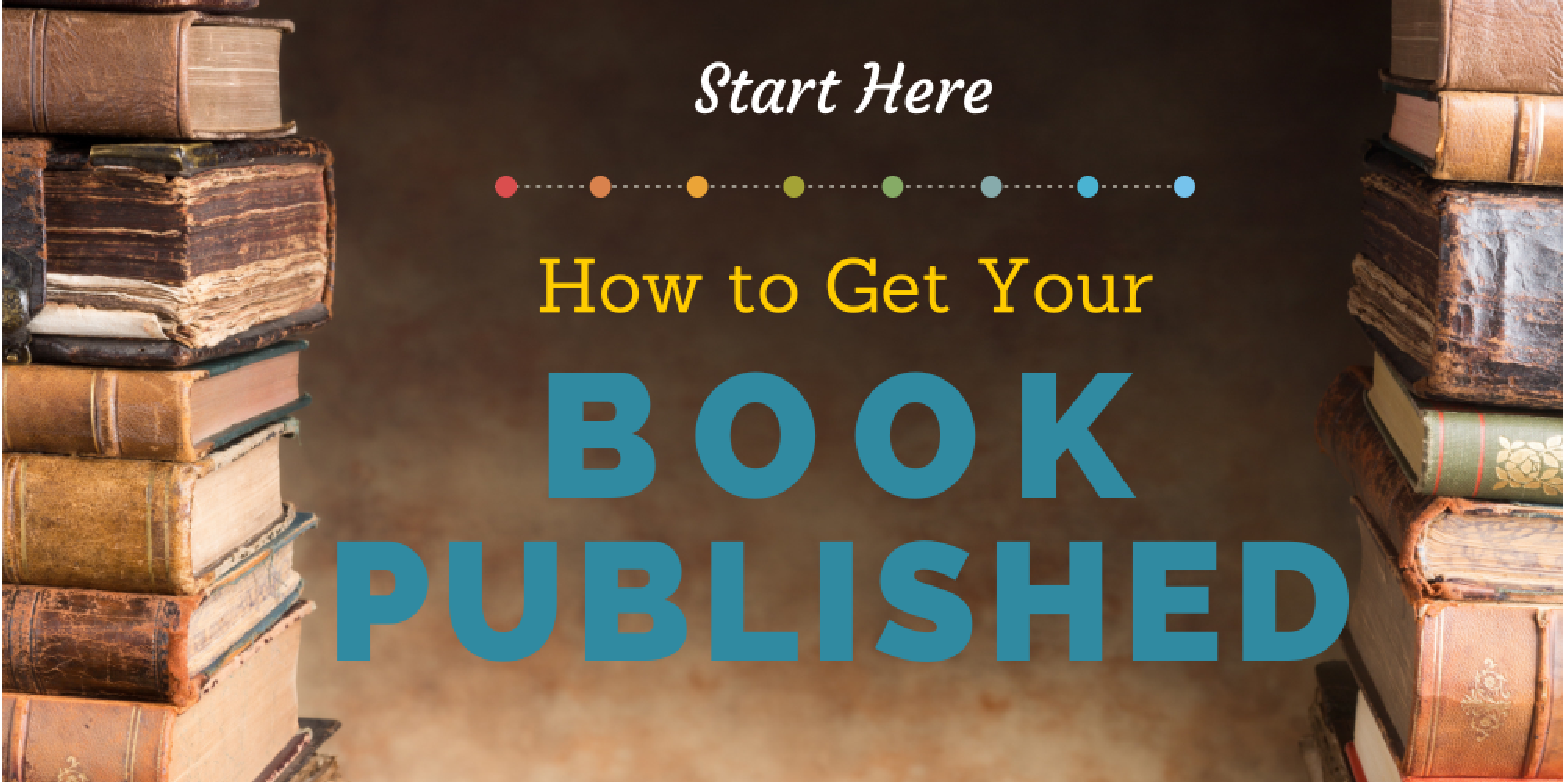
This post is regularly updated with new information and remains relevant if you’re looking for a traditional publishing deal.
If you want to get your book published, you have more choices than ever to accomplish your goal. This post lays out the process in the simplest terms possible. It is regularly revised and updated.
There are three primary paths to getting published:
- Find a traditional publisher who will offer you a book contract. This is what most writers have in mind when they think of publishing their book. A traditional publisher pays you, the author, for the right to publish your work, under certain terms and conditions.
- Hire a company to help you publish your book. There are thousands of publishing services out there, some cheap and some expensive. But the main thing they have in common is that they charge the author to publish. This includes hybrid publishers, assisted publishers, and publishing service companies.
- Self-publish. This is where you the author act as the publisher, and hire the help you need to publish and sell your work, most often through Amazon and other major retailers.
This post focuses on finding a traditional publisher.
In a traditional publishing arrangement, publishers assume all costs and pay you an advance and royalties. You must persuade them to accept your work by submitting an effective pitch or manuscript.
Not sure if you should traditionally publish or self-publish? Here’s how to make a decision.
4 steps to getting a book published
Getting your book traditionally published is a step-by-step process of:
- Determining your genre or category of work.
- Finding appropriate agents or publishers for your work.
- Preparing your submissions materials (a query letter or proposal, usually).
- Submitting your materials to agents or editors.
Step 1. Determine your work’s genre or category.
Publishers and agents often focus or specialize on certain types of work. They may publish only fiction or nonfiction; they may refuse to accept poetry or memoir; and so on. It’s important to correctly identify what you’ve written, at least in broad terms, so you can find the right publisher or agent to approach. Your genre or category also affects what materials you’ll be expected to submit.
- Novels and memoirs: Most first-time authors must finish their manuscript before approaching editors/agents. You may be very excited about your story idea, or about having a partial manuscript, but it’s almost never a good idea to submit your work at such an early stage. Finish the work first—make it the best you possibly can. Seek out a writing critique group or mentor who can offer you constructive feedback, then revise your story. Be confident that you’re submitting your best work. One of the biggest mistakes new writers make is rushing to get published. In 99% of cases, there’s no reason to rush.
- For most adult nonfiction (except memoir): Rather than completing a manuscript, you should write a book proposal—like a business plan for your book—that will convince a publisher to contract and pay you to write the book. Find out more information on book proposals and how to write one. You need to methodically research the market for your idea before you begin to write the proposal.
- Children’s work: In most cases, you should have a finished manuscript. Children’s picture book writers do not need to provide or submit illustrations, only the manuscript.
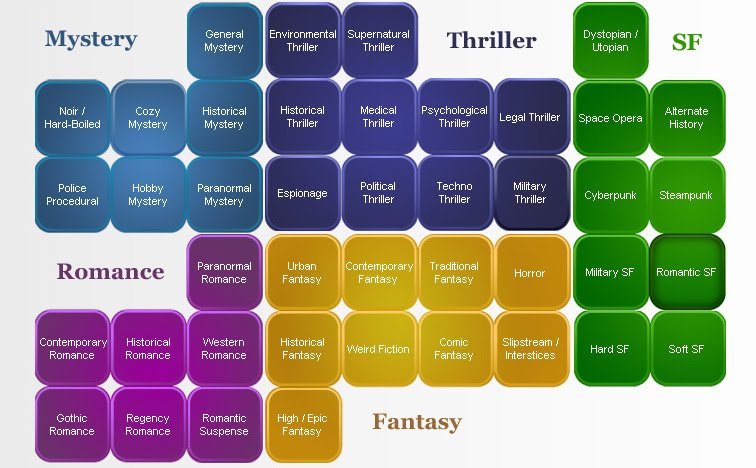
Some of the most common novel genres are: romance and erotica, women’s fiction, historical, mystery, crime, thriller, and science fiction & fantasy. Commercial fiction is a term that’s often used interchangeably with “genre fiction” (romance, mystery, thriller, SFF, etc). Work that doesn’t fall into a clear genre fiction category is sometimes called “mainstream fiction” by agents and publishers.
Upmarket fiction is a term most often applied to certain types of women’s fiction—the sort of novel that gets chosen for book clubs. Literary fiction encompasses the classics you were taught in English literature, as well as contemporary fiction (e.g., Jonathan Franzen, Margaret Atwood, or Hillary Mantel). For more on the distinctions here, I recommend agent Carly Watter’s post.
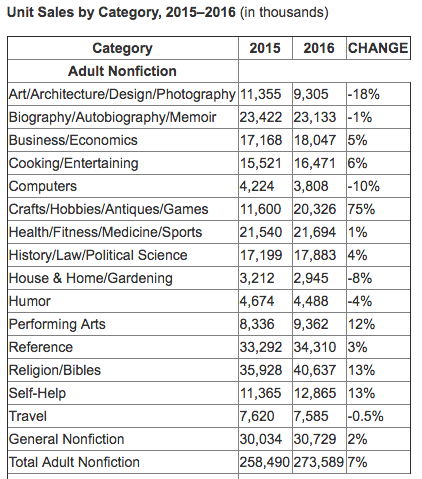
Some of the most popular nonfiction categories are: business, self-help, health, advice/relationships, personal development, and memoir.
Within the publishing industry, nonfiction is often discussed as falling under two major, broad categories: prescriptive (how-to, informational, or educational) and narrative (memoir, narrative nonfiction, creative nonfiction). You can get a sense of what nonfiction categories exist by browsing Amazon’s categories (see their lefthand navigation) or simply visiting a bookstore.
Books that are suitable for Big Five publishing
Some books are more commercial than others; anything falling into genre fiction is by default a commercial work. Most nonfiction, if it would be stocked in your average bookstore, is commercial. “Big Five” New York publishers are interested primarily in commercial work—work that is meant to sell in big retailers, big-box stores, etc.
The most important thing to remember is that not every book is cut out to be published by a New York house, or represented by an agent, but most writers have a difficult time being honest with themselves about their work’s potential.
Here are some rules of thumb about what types of books are suitable for a Big Five publisher:
- Genre or commercial fiction: romance, mystery, crime, thriller, science fiction, fantasy, young adult, and so on.
- Nonfiction books that would get shelved in your average Barnes & Noble or indie bookstore—which requires a strong hook or concept and author platform. Usually a New York publisher won’t sign a nonfiction book unless they anticipate selling 10,000–20,000 copies.
Works that can be difficult to sell:
- Books that exceed 120,000 words, depending on genre
- Poetry, short story, anthologies, or essay collections—unless you’re a known writer, or have a platform
- Nonfiction books by authors without expertise, authority, or visibility to the target audience
- Memoirs with common story lines—such as the death of a loved one, mental illness, caring for aging parents—but no unique angle into the story (you haven’t sufficiently distinguished your experience—no hook)
- Literary and experimental fiction
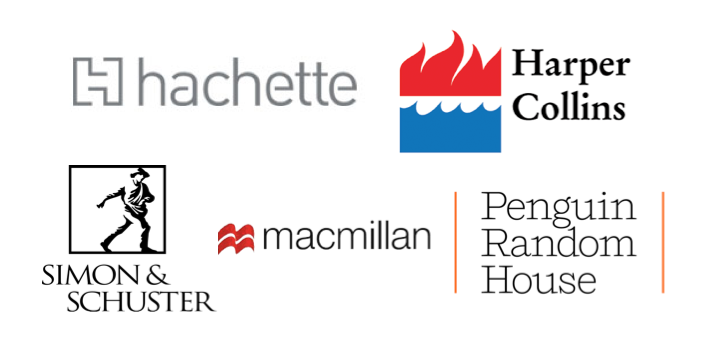
If you write fiction or memoir, the writing quality usually matters above all else if you want to be traditionally published. Read in your genre, practice your craft, and polish your work. Repeat this cycle endlessly. It’s not likely your first attempt will get published. Your writing gets better with practice and time. You mature and develop.
If you write nonfiction, the marketability of your idea (and your platform) often matter as much as the writing, if not more so. The quality of the writing may only need to be serviceable, depending on the category we’re talking about.
If your work isn’t a good candidate for a New York house, don’t despair. There are many mid-size houses, independent publishers, small presses, university presses, regional presses, and digital-only publishers who might be thrilled to have your work. You just need to find them. (See the next step.)
Deciding If You Need an Agent
In today’s market, probably 80 percent of books that the New York publishing houses acquire are sold to them by agents. Agents are experts in the publishing industry. They have inside contacts with specific editors and know better than writers what editor or publisher would be most likely to buy a particular work.
Perhaps most important, agents negotiate the best deal for you, ensure you are paid accurately and fairly, and run interference when necessary between you and the publisher. The best agents are career advisers and managers.
Traditionally, agents get paid only when they sell your work, and receive a 15% commission on everything you get paid (your advance and royalties). Avoid agents who charge fees.
So … do you need an agent?
It depends on what you’re selling. If you want to be published by one of the Big Five, most certainly.
If you’re writing for a niche market (e.g., vintage automobiles), or have an academic or literary work, then you might not need one. Agents are motivated to represent clients based on the size of the advance they think they can get. If your project doesn’t command a sizable advance (at least 5 figures), then you may not be worth an agent’s time, and you’ll have to sell the project on your own.
Here’s how to find literary agents and how to evaluate them.
Step 2. Find publishers and agents.
Once you know what you’re selling, it’s time to research which publishers or agents accept the type of work you’ve written. Again, be aware that most New York publishers do not accept unagented submissions—so this list includes where to find both publishers and agents. This is not an exhaustive list of where you can find listings, but a curated list assuming you want to focus on the highest-quality sources.
- Duotrope.com. Since the decline of Writer’s Market (see below), this is the best database for identifying publishers. Subscription required.
- PublishersMarketplace.com. This is the best place to research literary agents; not only do many have member pages here, but you can search the publishing deals database by genre, category, and/or keyword to pinpoint the best agents for your work. Subscription required.
- QueryTracker.net. About 200 publisher listings and 1,000 agent listings. Basic service is free.
- WritersMarket.com. Thousands of agent and publisher listings were once found here, but the site is currently inactive. You can try the print edition, or Jeff Herman’s competing guide.

Step 3. Prepare your submission materials.
Every agent and publisher has unique requirements for submitting materials. The most common materials you’ll be asked for:
- Query letter. This is a 1-page pitch letter that gives a brief description of your work. (More on this below.)
- Novel synopsis. This is a brief summary (usually no more than 1-2 pages) of your story, from beginning to end. It must reveal the ending. Here’s how to write a novel synopsis.
- Nonfiction book proposal. These are complex documents, usually 20-30 pages in length, if not double that. For more explanation, see my comprehensive post.
- Novel proposal. This usually refers to your query letter, a synopsis, and perhaps the first chapter. There is not an industry standard definition of what a “novel proposal” is.
- Sample chapters. When sending sample chapters from your novel or memoir, start from the beginning of the manuscript. (Don’t select a middle chapter, even if you think it’s your best.) For nonfiction (non-memoir), usually any chapter is acceptable.
The All-Important Query Letter
The query letter is the time-honored tool for writers seeking publication. It’s essentially a sales letter that attempts to persuade an editor or agent to request a full manuscript or proposal.
- Here’s my definitive post on writing a query for a novel.
- Here’s how to write a query for a nonfiction book.
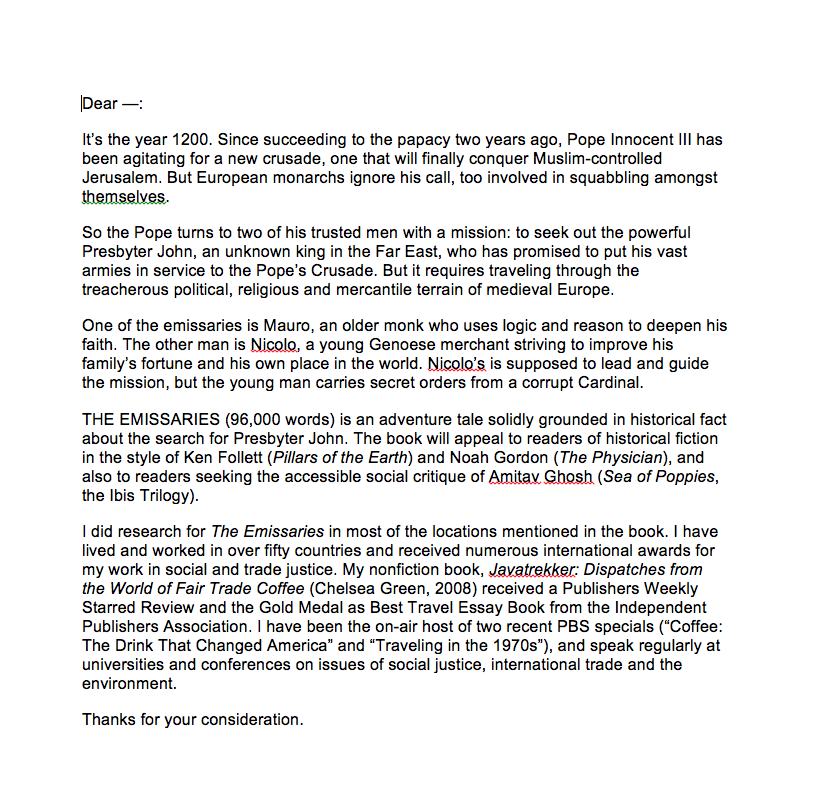
Step 4. Submit your materials.
Almost no agent or editor accepts full manuscripts on first contact. This is what “No unsolicited materials” means when you read submission guidelines. However, almost every agent or publisher will accept a one-page query letter unless their guidelines state otherwise. (If they do not accept queries, that means they are a completely closed market.)
After you send out queries, you’ll get a mix of responses, including:
- No response at all, which is usually a rejection.
- A request for a partial manuscript and/or a synopsis.
- A request for the full manuscript and/or synopsis.
If you receive no requests for the manuscript or book proposal, then there might be something wrong with your query. Here is how to improve your query letter.
If you succeed in getting your material requested, but then get rejected, there may be a weakness in the manuscript or proposal.
How Long Should You Keep Querying?
Some authors are rejected hundreds of times (over a period of years) before they finally get an acceptance. If you put years of time and effort into a project, don’t abandon it too quickly. Look at the rejection slips for patterns about what’s not working. Rejections can be lessons to improve your writing.
Ultimately, though, some manuscripts have to be put in the drawer because there is no market, or there isn’t a way to revise the work successfully. Most authors don’t sell their first manuscript, but their second or third (or fourth!).
Protecting your rights
You have nothing to fear in submitting your query or manuscript to an agent or publisher. If you’re worried about protecting your ideas, well, you’re out of luck—ideas can’t be protected under copyright, and no publisher or agent will sign a nondisclosure agreement or agree to talk with a paranoid writer who doesn’t trust them. (Just being blunt here.)
If you’re worried about protecting your copyright, then I have good news: your work, under law, is protected from the moment you put it in tangible form. You can find out more about protecting your rights here.
Do you have to “know someone”?
No, but referrals, connections or communities can certainly help! See the related question below about conferences.
The self-publishing option
Typically, writers who get frustrated by the endless process of submission and rejection often look to self-publishing for satisfaction. Why waste countless months or years trying to please this or that picky agent/editor when you can easily get your book available on Kindle (or as print-on-demand) at almost no cost to you?
Such options may afford you the ability to hold your book in your hands, but it rarely leads to your physical book reaching bookstore shelves—which ends up surprising authors who’ve been led to believe otherwise.
Self-publishing requires significant and persistent effort into marketing and promotion, not to mention an entrepreneurial mindset. It usually takes a few books out on the market before you can really gain momentum, and most first-time authors don’t like to hear that—they’re not that committed to writing without an immediate payoff or some greater validation.
Finally, most self-published authors find that selling their book is just as hard—if not harder than—finding a publisher or agent.
That said, independent authors are fiercely passionate about their work and their process, and some are much happier and satisfied going it alone. But those who succeed and profit often devote years of their life, if not their entire lives, to marketing and promoting their work. In short: It’s a ton of work, like starting a small business (if you do it right).
So, you can self-publish, but it all depends on your goals and what will satisfy you. To learn more: Start Here: How to Self-Publish Your Book.
Posting your work online
Many writers wonder if they’ll ruin their chances at traditional publication if they self-publish an ebook, use Wattpad, or put chapters on their website. In brief, no, you are not ruining your chances. Read more about this issue here.
Navigating the publishing industry
- Publishing is a business, just like Hollywood or Broadway. Publishers, editors, and agents support authors or projects that will make money and provide a good return on investment. It used to be that this return on investment could happen over a period of years or several books. Now, it needs to happen with one book and in less than one year.
- Professionalism and politeness go a long way toward covering up any amateur mistakes you might make along the way.
- Unless you live under a lucky star, you will get rejected again and again and again. The query and submission process takes enormous dedication and persistence. We’re talking about years of work. Novelists and memoirists often face the biggest battle—there’s enormous competition.
- Never call an agent or editor to query or ask questions (or just chat) if you are not a client or author. Never query by telephone—and I wouldn’t do it even if the guidelines recommend it. You’ll mess it up.
- Agents and editors do not want you (a non-client or author) to visit them at their offices. Do not plan a visit to New York and go knocking on doors, and don’t ask an agent/editor for a lunch or coffee appointment if you don’t have a relationship already. If you’d like to interact with an agent or editor, attend a writers conference.
- When working with a traditional publisher, you have to give up a lot of power and control. The publisher gets to decide the cover, the title, the design, the format, the price, etc. You have to go through rounds of revisions and will likely have to change things you don’t want to change. But you must approach the process like a professional, not a high-maintenance artiste.
- You’ll be far more attractive to a publisher if they believe you’ll be an active marketer and promoter of your book. If you come to the table with media savvy or an established platform (audience or readership), you’ll have an easier time getting that first deal.
- For nonfiction authors: Don’t go looking for a publishing deal because you need the authority or platform that a book can give you. Rather, you must already have the platform and authority, and thus be qualified to write a book. YOU bring the audience to the publisher, not the reverse.
Why you should attend writing conferences
Your education and insight into the industry will advance exponentially. You’ll gain an understanding that’s often impossible from just reading about it. You will meet agents and editors, and start to see them as real people. If you have an appointment or consultation with a publishing professional, it will shorten your path to publication. You can get the reasons, immediately, that an agent or editor may not be responding favorably to your work.
Many writers are familiar with the reasons to attend conferences, but not all understand how to get more out of them. Here are 3 ways you can get the most out of your experience.
- Select a conference where you can meet with a specific author, editor or agent who is absolutely ideal for your work (after lengthy and intensive research). Get a critique session or an appointment—but only if you feel like you’ve taken your work as far as you possibly can on your own. This is important.
- During any formal appointments or critiques, plan to talk about 20-30% of the time. Before meeting, develop a specific list of questions that, if you had the answers, you would know specifically what your next steps are (for your project or your career) when you leave. Do not attend any appointment expecting to be offered a deal or representation. Go for the learning experience and the opportunity to have a professional consultation. That’s what it is.
- Closely study the backgrounds/bios of every speaker, agent, and editor who is attending. Be knowledgeable for any chance conversations you have; having this knowledge will also spark questions you could ask during panels or social hours. Don’t be the person who asks the obvious question you could’ve figured out by paying attention to the program. Delve deeper. Make your questions count.
Here is my comprehensive guide to writing conferences.
When to hire professional help
Should you hire a freelance editor to help improve your manuscript before submitting? There’s no one right answer for everyone, but I discuss considerations and guidelines here.
Reasons you might fail to get published
- You rush to submit your work before it’s ready. This is particularly true of writers who are dizzy with excitement after completing their very first book-length manuscript. But if you’ve just spent months (or years!) writing a manuscript, why rush it to an agent or editor, and why rush it to just any agent or editor? And why rush it if you’re new to the publishing business?
- Your story premise or book concept lacks originality. A novel or memoir needs to feel “fresh,” relevant to today’s readers, and not derivative of existing bestsellers. (What’s “fresh” is subjective, of course.) How do you know if your idea is tired by an agent’s standards? Reading lots of popular fiction helps; it helps you learn what’s been done already, and how you might add your own twist. Here’s a post on improving your story premise.
- It’s tough to achieve objectivity. When you finish a significant manuscript or proposal that took a long time to complete, you need time away and distance to assess its strengths and weaknesses.
- It’s tough to make progress without a mentor. A good critique partner can be invaluable to your growth as a writer. When you don’t have the time or willingness to take enough steps back from your work, or see its flaws, others can offer a really hard push.
- It’s easy to take validation from family and friends as a sign you ought to write and publish. Has your family encouraged you? Have your friends told you that you’re a brilliant writer? Do your children love your stories? While you need support, you also need to ignore what these people are telling you. They’re not publishing professionals. You need to write because you can’t do anything else. Because you would suffer if you didn’t. Your motivation to write has to come from within. Don’t write (only) because you were given validation or permission by someone close to you. What you really need (require) is your own inner conviction.
Also consider: What is your motivation for trying to get published? A little self-reflection might be in order before you chase after an agent or publisher. Read my post 3 Questions Every Creative Person Must Ask.
Mostly what this game boils down to is patience. If you don’t have it, you will get frustrated and give up.
If you’re looking for more in-depth guidance:
- My book: The Business of Being a Writer, published by The University of Chicago Press, starred review from Library Journal

Jane Friedman has spent nearly 25 years working in the book publishing industry, with a focus on author education and trend reporting. She is the editor of The Hot Sheet, the essential publishing industry newsletter for authors, and was named Publishing Commentator of the Year by Digital Book World in 2023. Her latest book is The Business of Being a Writer (University of Chicago Press), which received a starred review from Library Journal. In addition to serving on grant panels for the National Endowment for the Arts and the Creative Work Fund, she works with organizations such as The Authors Guild to bring transparency to the business of publishing.

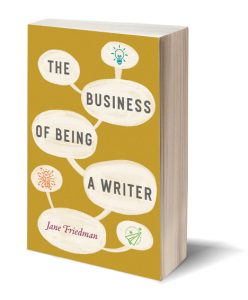
You mention the marketing aspect involved in self-publishing and the expectation of the same with a traditional publisher. What do you see as the difference between marketing a self-pub and a traditionally published book? In reading other people’s thoughts, the author’s involvement appears to be key in either situation.
The author’s involvement is necessary/critical either way, yes.
When working independently, you often need to build credibility for yourself and your book because you don’t have a traditional publisher backing you. This means getting people of authority/importance to help vouch for your book (via blurbs, reviews, etc).
You also don’t have the automatic ability to get reviews and mainstream media attention for a self-published work, and unless you have friends in high places, you’ll have to hire a professional publicist to work with you—someone who DOES have connections to the media and can help pitch your work. This is nearly impossible to do effectively on your own.
Of course, these activities assume your book is appropriate for mainstream media coverage. If you’re appealing to a niche market, and you’re known as an authority in your niche, these things matter very little.
So either way, an author needs to go into the process expecting to be involved in the marketing. There is no magic pill like in weight loss or easy money-making process like in the lottery.
Along with publishing expertise and marketing avenues, the primary value in traditional publishing then is the weight of authority.
Yes, authority/credibility is one value.
Also: physical distribution is next to impossible without a traditional publisher.
Also: experience and savvy in putting together a marketable package in book form that is competitive.
Also (hopefully): editorial excellence.
Yes, authority/credibility is one value.
Also: physical distribution is next to impossible without a traditional publisher.
Also: experience and savvy in putting together a marketable package in book form that is competitive.
Also (hopefully): editorial excellence.
I’ve decided with this amazing post ( bookmarked) I will create an online quiz. It will be multiple choice with questions like ” Do you have to earn your advance before drawing royalty checks?” and “Do you have to do any marketing or will your pub do it all?” so when I’m asked this they can just refer to the quiz and post.
Great one Jane.
LOL! Terrific idea.
Dear Jane,
I am a young author, (not yet published), at the age of 13. Amazing, so I’ve been told, but I don’t really think so. I aspire to be published this year, if possible. I’m afraid that publishers or editors might overlook my work, or not give it a second look because of my age. I’ve heard many doubts, such as “You’re too young,” and I understand that I am a minor, and I cannot self publish. (Am I correct..?)
But this information has helped me quite a lot, and I have a few questions…
I don’t know if I am able to get into this because of my age, and/or what I’ve done with my stories. Not many of them are “Novel or memoir length” and such, but I’ve published them online on Wattpad, as well as a website (I’ve used much longer), Quotev.
My point of the matter is, I feel I am too young, this all coming from myself, to understand this whole process of business and getting published. I have a strong passion for getting my stories out there, but I think that I’m too unexperienced with things like this to know where to begin.
Could you help me? If you could, that would me marvelous. Thank you so much!
Hi Caroline,
I’m not really sure if there are age limitations when it comes to using Amazon KDP, Smashwords, etc. (I do know you need to offer tax ID information—your Social Security number.)
If you feel like you’re too young to understand the business side of getting published, then you need to wait until you feel like you CAN handle it, or find a teacher/mentor to help you in person, or take small steps on your own. Try publishing shorter works in online magazines/journals first. Continue using Wattpad. Continue writing and reading.
Hello Caroline, My name is Freyjaa, and I am at the age of 10. I simply used the websites on this post to help me find a publisher, so you can too.
Way to go, Freyjaa! 🙂
Hey there, I have a friend who self published at 14, so I assume there aren’t any age limits.
No age limits – although depending on the laws where you live, if you’re under 18, you may need a parent/guardian to sign a publishing contract.
Great info, Jane!
Thanks, Jane. I passed your link to a few likely folks who need to know what reality looks like. One point I’d like to make is that publishing houses rarely offer book editing and normally not for new authors at all. That is to be accomplished on the author’s own dime prior to submitting. The in-house editor is more like the manuscript’s champion, not the partner in publication. It is also true that the book doctors and editors sometime make more $$ from a book than the author!
I don’t know that I’d say publishers offer editing “rarely.” But I agree that mileage may vary, and it remains a contentious issue how much time editors do now spend on actual editing.
I think the editor (and publisher) still serve as partners (otherwise what’s the point?), in varying ways, and the best editors/publishing houses ensure editorial excellence without the author having to find outside help.
Thank you!
[…] https://janefriedman.com/2012/01/28/start-here-how-to-get-your-book-published/ Share this:TwitterFacebookLinkedInTumblrEmailStumbleUponRedditDiggLike this:LikeBe the first to like this post. […]
Great post, Jane!
There are two things I’d like to mention on the subject.
First, finding a critique group of like minded writers is invaluable because, as you wrote, “it’s tough to achieve objectivity” about your own writing.
Secondly, small press publishers bridge the gap between the large publishing houses who require you to have an agent and the other option: self-publishing.
Great points! Completely agree.
yep I have beta readers in the same genre as a VERY popular series that are now liking my book more. Three read it just under a day. So having those to help you tweak your eb and flow is very important.
Hey Jane, bookmarking this doesn’t seem enough. I’ve said this before about your articles and I’ll say it again for this post: I just want to make wallpaper out of it and use it. What you offer here is thorough, detailed and informative insight and it feels like it’s coming from a friend. The advice is genuine and objective. Thank you.
Rosie Pova
Hey Jane, let me ask you this. Is it true that a great query letter can sell a mediocre manuscript and a bad query can kill a good one?
Many thanks for your kind comments!
A bad query can definitely kill a good manuscript—and based on some of the poor queries I see, it’s not uncommon.
A great query letter can get a mediocre manuscript read or requested, but not represented or sold.
Jane,
Outstanding post. This really covers everything an aspiriring writer needs to know. Thanks for sharing your knowledge and insights.
A pleasure to help! Thanks for reading.
[…] Read the entire article here. […]
[…] https://janefriedman.com/2012/01/28/start-here-how-to-get-your-book-published/ Great post by Jane Friedman laying out the basics of what writers need to consider on the road to book publication. […]
[…] Start Here: How to Get Your Book Published from Jane Friedman. […]